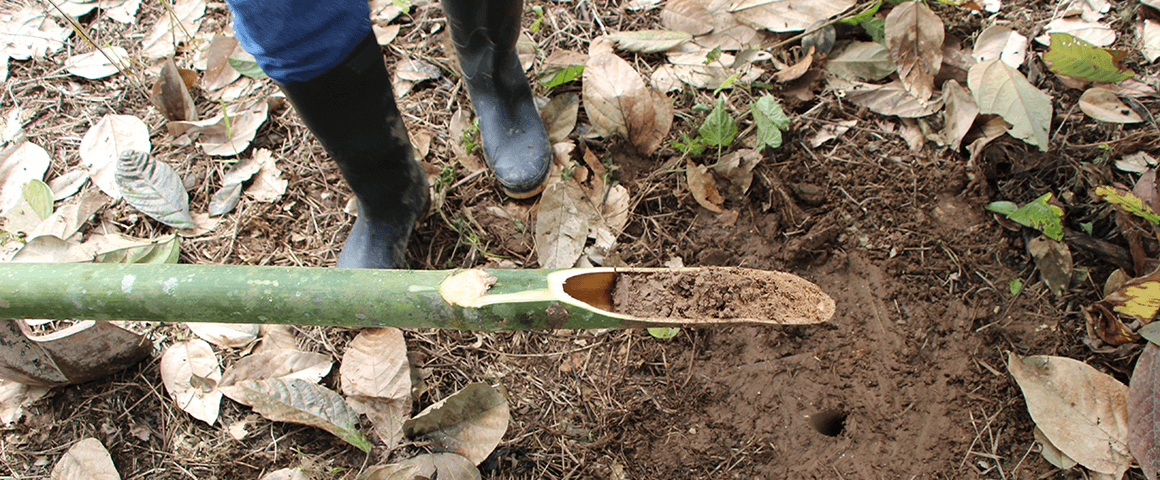- Home
- Worldwide
- CIRAD worldwide
- Projects
- Projet CLIMALOCA
Fostering climate-relevant, low cadmium innovations to enhance the resilience and inclusiveness of the growing cocoa sectors in Colombia, Ecuador and Peru - CLIMALOCA

Sampling with a bamboo tool at the foot of a cacao tree to measure cadmium in the soil © Claire Lanaud, Cirad
Issues
A new European Union food safety regulation on cadmium in cocoa powder and chocolate came into force in January 2019. In recent years, cocoa importers have started rejecting beans with cadmium contents exceeding 1 mg/kg and preferably purchasing with a content under 0.5 mg/kg. Cadmium concentrations in cocoa from the Andean countries (Colombia, Ecuador, Peru) frequently exceed these maximum levels, although there are considerable variations both between and within the countries. Overall, the new EU regulation has strong repercussions for the cocoa value chains in these countries and, consequently, some worrying economic and social repercussions for low-income farmers, especially those in (post)conflict zones.
Description
The project starts out from the principle that agricultural innovations require the participation of different end-users, for joint development of farming systems and practices adapted to the context and grounded in robust interdisciplinary science, whilst creating an environment conducive to their adoption and development. It is organized in four interdisciplinary research work packages (WP) combining soil sciences, genetics, socio-economics, and tools for dissemination of the research results:
- WP1 will involve analysing and mapping the factors that determine the risks and vulnerabilities associated with cadmium and with climate change;
- WP2 will develop solutions for reducing cadmium in cocoa beans through changes in production practices, such as using compounds modifying soil properties, or genetic material adapted to low cadmium uptake;
- WP3, through the development of multi-stakeholder platforms, will involve co-developing mitigation and scaling strategies.
Expected changes
The coordinated activities to be undertaken in selected cocoa production areas in the three countries will generate the following research results:
- Development and dissemination of baselines and impact assessments to guide public policies in favour of a sound transformation of the cocoa sector, in light of the climatic context, and low cadmium contents;
- Lowcadmium technologies and genotypes identified and assessed on the basis of robust scientific assessments in research trials at several geographical sites ;
- Lowcadmium and climate-smart technologies disseminated and scaled up via multi-stakeholder platforms;
- Enhancement of regional research coordination, data and knowledge sharing, and scientific capacity building (laboratories).
[1] Cadmium is a heavy metal which has toxic effects on the kidneys, bones and respiratory system in low concentrations in the human body, and is classed as a human carcinogen.























